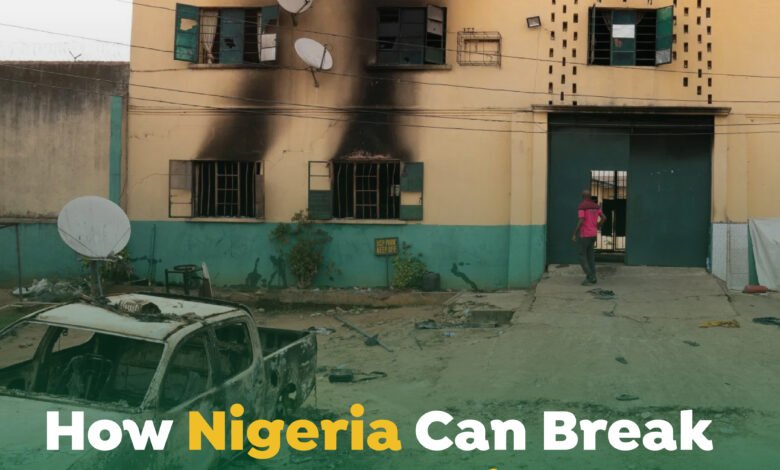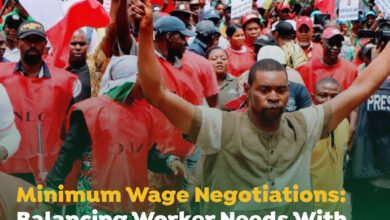
Imagine waking up to the chilling news that convicted criminals, including robbers and murderers, have escaped from prison and are roaming free in your community.
This is the unfortunate situation many Nigerians find themselves all too often, as jailbreaks have become a recurring nightmare in the country.
On April 25, 2024, the disturbing news of another jailbreak at the Suleja Medium Security Custodial Centre rented the airwaves.
The jailbreak said to have been caused by a rainstorm that destroyed the prison facilities, led to the escape of at least 119 inmates, some of whom have been convicted of robbery, murder, and other serious crimes.
Rainstorms are proving to be an unimaginable escape route for inmates in Nigeria, incredibly a downpour triggered a jailbreak for the third time, allowing prisoners with varying sentences to vanish.
This latest incident follows a similar escape on October 28th, 2019, when a shocking 122 inmates fled the Koton Karfe Correctional Centre in Kogi State. The troubling frequency of these rain-assisted escapes raises serious concerns about the security of correctional facilities in the country.
Describing the incident, a lawmaker representing Ikwo/Ezza South Federal Constituency in Ebonyi State, Lazarus Ogbee, said the jailbreak was embarrassing as it constitutes the “first of its kind in the world.” And the second flood-related prison break was on May 13, 2022, in Agbor prison, Delta State, where at least three inmates fled, taking advantage of the storm.
However, as with the cases of previous jailbreaks, Nigerians whose peace is usually threatened by the wandering inmates who forcefully gained their freedom through jailbreak have been blasting and criticising the government over its failure to contain the monster (jailbreak) that threatens their peace annually.
Overcrowding Blamed for Jailbreak
Following a visit to the Suleja Medium Security Custodial Centre, Nigeria’s Interior Minister, Olubunmi Tunji-Ojo, attributed the recent embarrassing jailbreak to the facility’s outdated structure and excessive inmate population.
Built in 1914 to house only 250 inmates, the prison held a staggering 499 before the escape.
This overcrowding, Minister Tunji-Ojo argued, significantly compromised security
Tunji-Ojo, who pledged that some of the affected correctional centres in the geo-political zones of the country will be relocated to create better space, security, and infrastructure, said, “I was not appointed to make excuses; I was appointed to take responsibility, and we are not shying away from taking responsibility.”
Jailbreak, a recurrent misnomer
On July 6, 2022, BBC reported that more than 5,000 inmates have escaped during jailbreak since 2020. Corroborating this report, the International Centre for Investigative Reporting (ICIR) equally reported that between 2016 and 2022, 6,620 inmates fled in 14 jailbreak incidents.
Explaining why prison breaks are rife in the country, the former Abia State Attorney-General and Commissioner for Justice, Prof. Awa Kalu, SAN, said jailbreaks are prevalent in the country because most of the correctional centres were built during the colonial era. In other words, the structures are weak and penetrable.
Prof. Kalu, the Coordinator of Legal National Defence for Human Rights, Nzube Ojiugo, ascribed the increase in jailbreaks to a weak judicial system. He stressed how people presumed innocent were locked up without trial. He said these people got mixed up with hardened criminals. He said, “Such a situation breeds violence, especially with several institutional lapses in Nigerian prisons which are glaring.”
Experts also attribute jailbreaks to corruption and the dishonesty among warders, who they claim sometimes connive with inmates.
Ending Jailbreaks — Experts’ Opinions
The Former Abia state commissioner for justice and Attorney-General, Prof. Awa Kalu, SAN, said to end jailbreaks in the country, the government must renovate, refurbish, renew, or reconstruct the correctional centres built in the colonial era. He equally advised the government to do something about those who have not been convicted but are kept in prisons across the country’s geo-political zones.
Similarly, Mr. Austin Njoku, a former spokesperson of the correctional service, advised the government on the state of the prisons. He said, “If you travel outside the country, you will discover that prison is built in quite an isolated place where there are buffer zones; you cross hurdles and red zones before you gain access. If you are coming with a mind to attack, before you reach the first gate, second gate, and third gate, the security will be aware that the person coming has an agenda.”
Mr Timothy Okoh, a security expert, also urged the government to, as a matter of urgency, address the issue of poor prison facilities and inadequate security features such as CCTV, motion sensors, and high electric fences. He added that those attacking the correctional centres do not do it alone, saying, “I believe there is a connivance with prison officials for these jailbreaks to happen.”
To truly end this cycle, Nigeria needs a three-pronged attack: Fix the infrastructure. Reduce overcrowding. Focus on rehabilitation. These three steps can stop jailbreaks and create a stronger, fairer justice system in Nigeria.





